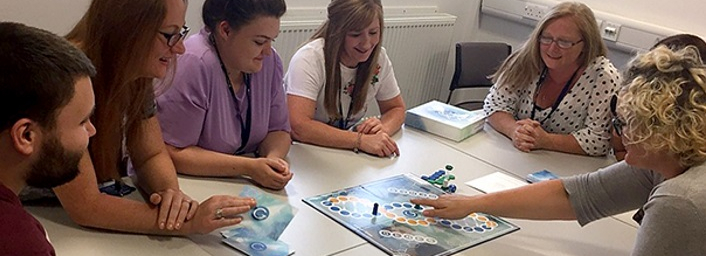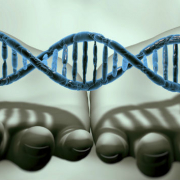Genomics Quiz: the results!
Last Friday we ran our ‘Genomics Quiz’. Find out the answers to our questions and which one of you has won your very own copy of The Genomics Game
Last week, to close our #GenomicsConversation week of action, we posted questions from The Genomics Game in a twitter quiz, announcing that the nurse or midwife with the most correct answers would win a copy of our fun and educational board game. The answers are listed below:
Question 1: True or false? Genetics is the study of all an individual’s DNA.
Answer: It’s false.
The study of all an individual’s DNA is called genomics. Genetics is the study of individual genes. Sometimes genetics and genomics are used interchangeably but they have different meanings.
Question 2: In healthcare we are interested in the 0.1% variation in our genome because it tells us what? A. Whether someone will develop a condition; B. Whether someone is more susceptible to a condition; C. Whether someone will react differently to a drug; D. All of these.
Answer: D – all are correct.
The 0.1% variation in our genomes can tell us whether someone might develop a genetic condition, or they’re more susceptible to a certain condition or disease. Some of those variants mean that we react differently to drugs. We’re only just starting to understand this.
Question 3: Is cancer a disease of the genome? Yes or no?
Answer: Yes, cancer is the most common disease of the genome.
Cells can become cancerous if their DNA is changed by lifestyle, chance or environmental factors. In the majority of cases these DNA changes occur within a person’s life, but in some rare cases these changes can be inherited.
Question 4: Someone is worried their family has an inherited condition. What could be an appropriate first action? A. Draw a family history; B. Access the family’s medical records; C. Meet with the patient’s immediate family.
Answer: A is correct.
By drawing a genetic family history of an individual and their close family members it may be possible to identify patterns that could indicate an inherited condition. To learn more about taking a family history, watch our educational videos.
Question 5: True or false? Antibiotic resistance hasn’t got anything to do with genomics.
Answer: It’s false.
Antibiotic resistance is due to changes in bacterial DNA. These changes allow bacteria to adapt so they can survive the antibiotics designed to kill them. As a result, some antibiotics can no longer be used to treat certain infections.
Question 6: Which of these conditions has a genetic cause? A. Cystic fibrosis; B. Huntington disease; C. Sickle cell anaemia; D. All of the above.
Answer: All these conditions are caused by genetic changes that are passed on from one or both parents.
Question 7: True or false? Results from a genetic test will only have clinical implications for the patient.
Answer: It’s false.
The results from a genetic test may reveal a condition that could affect the patient’s family or future offspring. Therefore, a genetic test result can have a greater clinical impact than that of other medical tests.
Question 8: To investigate an individual’s genome we need a sample of their DNA, and it must be good quality. Name at least 2 ways in which we can get that DNA.
Answer: We have a copy of our genome in almost every cell in our body. So, in theory, DNA can be extracted from any material containing cells.
For example:
- Hair roots
- Skin cells
- Bone marrow
- Blood
- Tumours
- Faeces
- Saliva
And the winner is… Michael Carter! Congratulations to Michael and to our other four correct answerers!
There are limited copies of The Genomics Game available via your local Genomic Medicine Centre. In the future, we may be producing more games, and you can register your interest in receiving a copy here.
For more information on what we offer, please see the courses and resources areas of our website.








